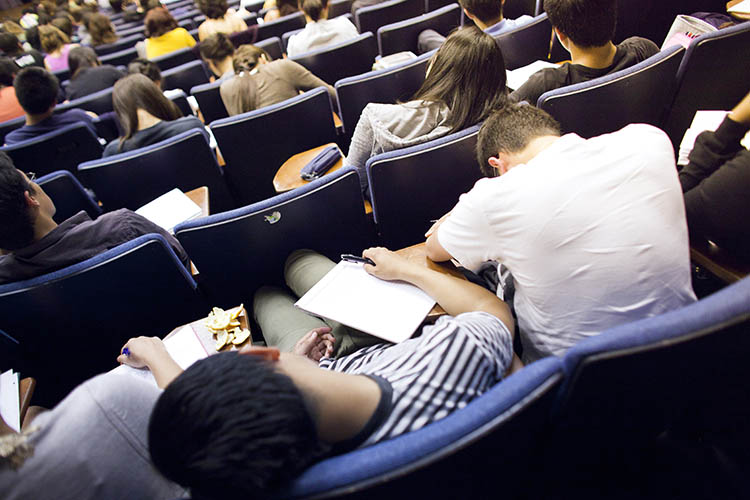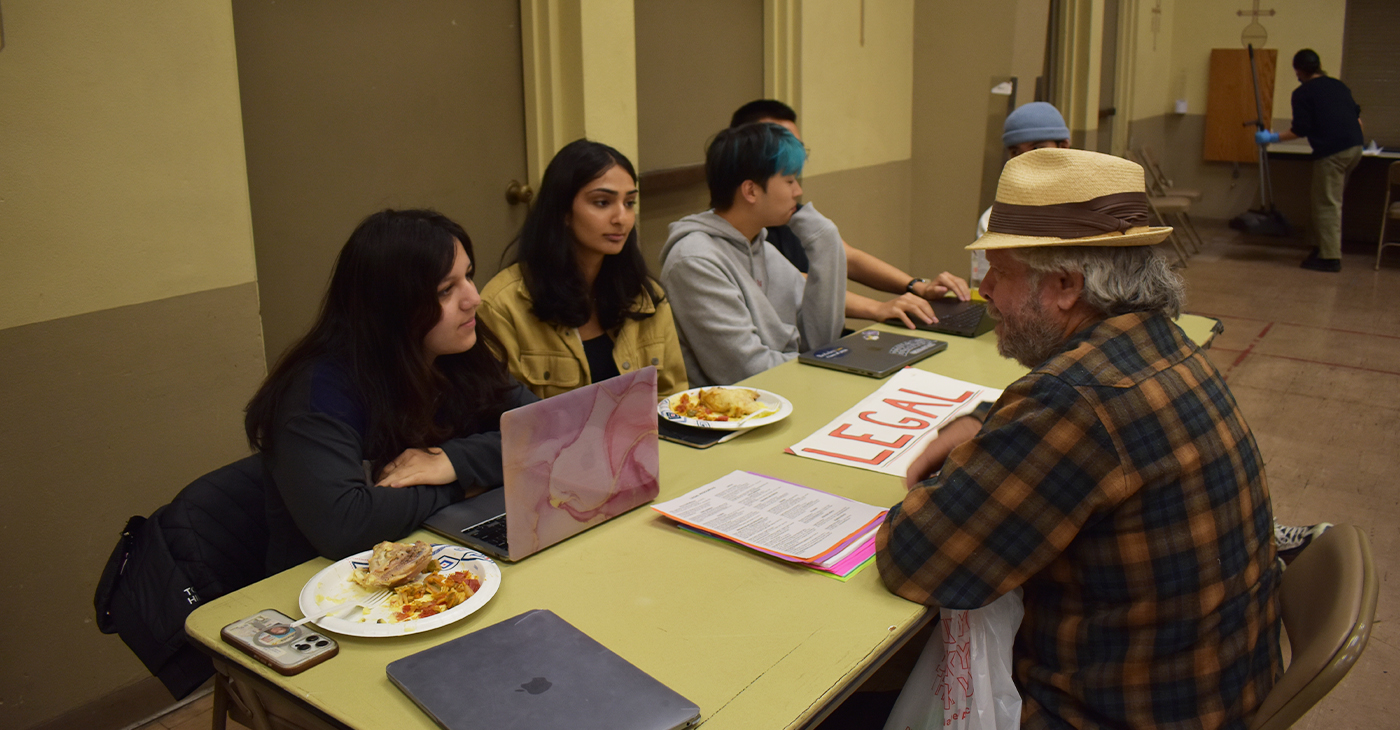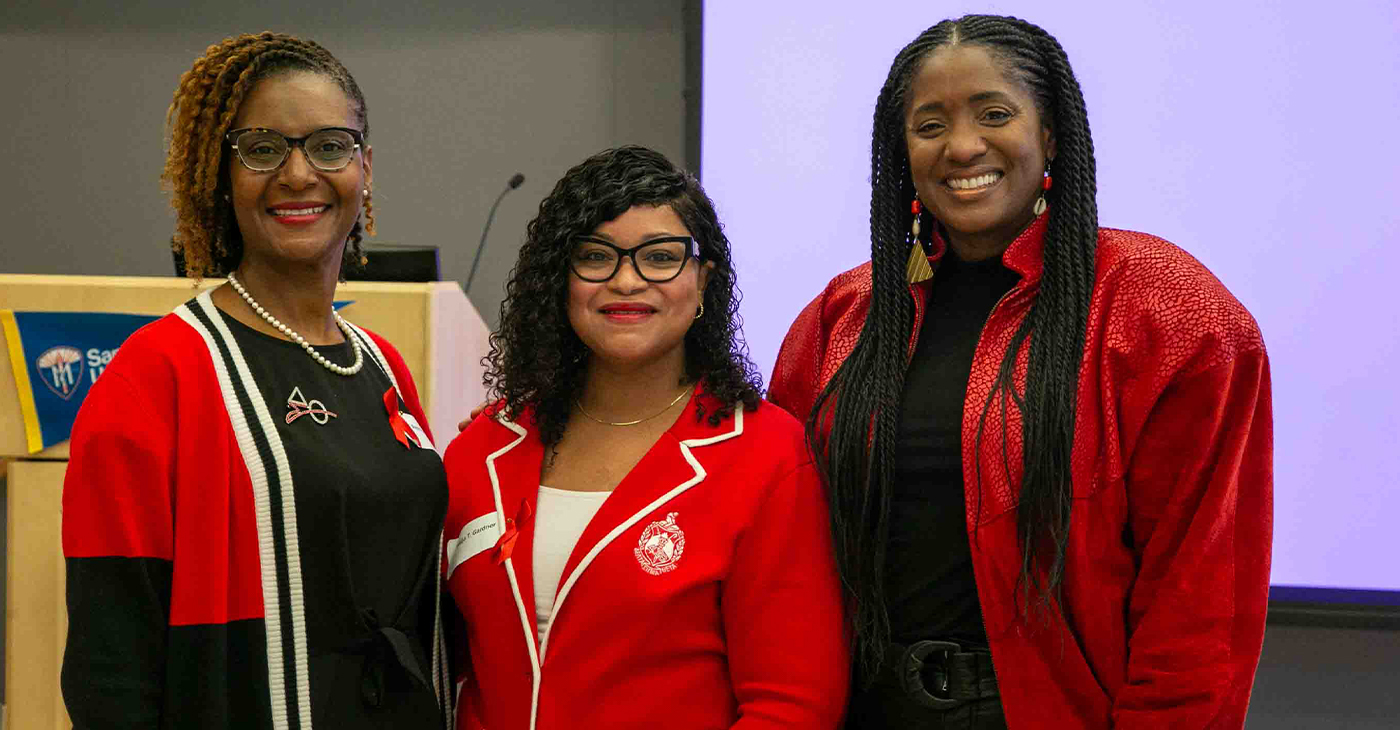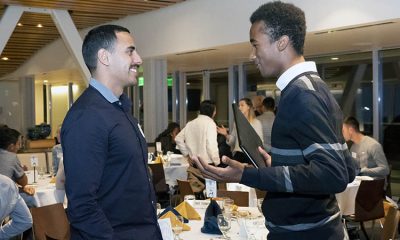Health
Anxiety ‘Epidemic’ Brewing on College Campuses, Researchers Find

The number of 18- to 26-year-old students who report suffering from anxiety disorder has doubled since 2008, perhaps as a result of rising financial stress and increased time spent on digital devices, according to preliminary findings released Thursday by a team of UC Berkeley researchers.
The percentage of all students nationally who reported being diagnosed with or treated for anxiety disorder climbed from 10 percent in 2008 to 20 percent in 2018, according to the findings by a research team led by Richard Scheffler, a professor at the Goldman School of Public Policy and School of Public Health.
Rates of anxiety disorder grew at higher rates for students who identified as transgender, Latinx and black, and they increased the closer all students got to graduation.
“It is what I am calling a ‘new epidemic,’ and that the data supports using that term, on college campuses,” Scheffler said. “We need a heightened national awareness of this very serious epidemic.”
Scheffler and his team examined nine years of data from the annual student National College Health Assessment survey and the National Longitudinal Survey of Youth — two nationwide examinations of student well-being. The group also conducted 45-minute interviews with 30 UC Berkeley students who identified as suffering from anxiety.
While Scheffler said he cannot firmly establish the causes for the rise in anxiety, he found strong correlations between anxiety disorder and financial instability, the amount of leisure time spent on digital devices and the level of education attained by a young adult’s mother.
“The correlations and the data are pretty powerful,” he said.
Specifically, the findings show that:
Young adults who come from families that have trouble paying bills are 2.7 times more likely to have anxiety than students who come from families that have no difficulty paying bills.
Young adults who spend more than 20 hours of leisure time per week on digital devices were 53 percent more likely to have anxiety than young adults who spend fewer than 5 hours a week on digital devices.
Young adults with mothers who had at least an undergraduate degree had a 45 percent greater chance of having anxiety than young adults whose mothers had less than a college degree. The surveys used in the analysis did not ask about the fathers’ level of education.
Scheffler also found that anxiety is associated with other serious problems beyond the overwhelming feelings of worry or nervousness associated with the disorder.
A student with anxiety is 3.2 times more likely to abuse alcohol or drugs, the findings show. Other negative outcomes correlated with anxiety included increased probability of having been sexually assaulted or attempting suicide.
All factors being equal, Scheffler also found that between 2008 and 2014, young adults with anxiety earned 11 percent less than those without anxiety.
“Anxiety has really very dire consequences for these students,” Scheffler said. “That’s a lot of pain and suffering.”
Scheffler, who joined Berkeley’s faculty in 1981, said he first began thinking about student anxiety 10 years ago, when he looked out at the 100 students in his lecture hall and saw faces stricken with worry.
“More than half the students were not looking at me, they were looking at their phones or their computers,” Scheffler said. “I told everyone to turn their phones off and put their computers away. I had four or five students who were so addicted, they could not do it. I actually had to go and take their phones away from them.”
“I said to myself, ‘You know, something’s going on here,’” he added. “That was the beginning. And then I watched for several years.”
While Scheffler doesn’t make policy recommendations in his preliminary findings, he said the first step in dealing with the rise in anxiety is increasing awareness among faculty and college administrators.
“I want the faculty and the university leadership here at Berkeley and across the country to know that this epidemic is out there, and they need to understand it,” he said. “The students need help.”
To that end, the Berkeley Institute for the Future of Young Americans, a research center affiliated with the Goldman School of Public Policy, is hosting a panel discussion on the findings Thursday afternoon that will feature Chancellor Carol Christ, student leaders and UC Berkeley health system administrators.
“We know that Millennials and GenZ are experiencing anxiety like no previous generation,” said Sarah Swanbeck, the executive director of the institute. “While there’s a lot we still don’t know about what’s causing the spike in anxiety disorder, this report highlights that the problem is actually getting worse. It’s an important signal to college administrators that much more must be done to tackle this issue.”
Scheffler will present his findings and hopes the audience of deans, counselors, students and program coordinators will take his message to heart.
Berkeley offers a number of resources for students, including counseling at the Tang Center, help meeting basic needs and other programs.
Contact Will Kane at willkane@berkeley.edu
Activism
A Student-Run Group Provides Critical Support Services to Underserved Residents
Those visiting The Suitcase Clinic can get legal advice, sign up for food assistance, receive housing resources, get medical help, or enjoy a hot, fresh meal. They can also get haircuts and foot washes from the student volunteers. Nilo Golchini, executive director of the clinic, said one of the goals for most of the students working there is helping bridge the gap of trust that exists between many unhoused people and the healthcare and social welfare systems.

Part One
By Magaly Muñoz
Every Tuesday evening, the dining hall of First Presbyterian Church fills up with dozens of people eating, laughing and moving from table to table, receiving much-needed services from UC Berkeley students – just a few blocks away from the university’s campus.
Individuals seeking support services can be found in this multi-stationed room on the south end of the church talking to law students, student case managers, or receiving medical attention in a corner by healthcare professionals.
This weekly event is hosted by Cal students through a volunteer-run program called The Suitcase Clinic.
The clinic, founded in 1989, was intended to offer free resources to underserved communities in Berkeley and surrounding cities. The majority of the clinic’s clientele are unhoused or low-income people looking for extra support.
Those visiting the clinic can get legal advice, sign up for food assistance, receive housing resources, get medical help, or enjoy a hot, fresh meal. They can also get haircuts and foot washes from the student volunteers.
Nilo Golchini, executive director of the clinic, said one of the goals for most of the students working there is helping bridge the gap of trust that exists between many unhoused people and the healthcare and social welfare systems.
During their tenure in the program, many of the students say they become strong advocates for homelessness rights.

Visitors of the Suitcase Clinic can receive haircuts and foot washing by student volunteers every Tuesday evening. Photo by Magaly Muñoz.
“We’re also standing in solidarity with them. So, it’s not saying, ‘I’m going to help you, but I’m also going to stand with you,’” Golchini said.
Student volunteers get extensive training prior to working directly with clients. Those interested have to take a semester-long class to become versed in areas such as outreach, intersectionality, how to interact with unhoused people, how to sign people up for social services. and more.
Volunteers then get to pick from three different clinics: General, Women’s, or Youth and LGBTQ+.
The General Clinic is the most popular among visiting residents, while Women’s and Youth/LQBTQ+ have more specialized services for attendees.
The Women’s Clinic has many of the similar services to General, but also includes nail painting, childcare, and massages.
The Youth and LGBTQ+ Clinic offers a safe space for young people navigating living on the streets, with services that include housing referrals, wellness and recreation classes and employment resources.
Golchini explained that it’s important for them to keep these clinics separate because the different demographics experience poverty and homelessness differently than those who visit the General Clinic.

Suitcase Clinic student workers posing for a photo with a frequent clinic attendee. The Clinic is open to Berkeley unhoused and low-income residents who need medical or legal service, or a hot meal. Photo by Magaly Muñoz.
“We’re able to provide spaces where people can come in and feel safe and not feel like they’re constantly worried that something’s going to happen to them,” she said.
An outreach team also visits encampments every other Saturday in the Berkeley area to provide hygiene kits and encourage people to visit the in-person clinic, if possible.
However, Golchini said engagement has been low for some time now due to a recent decision by the U.S. Supreme Court that allows cities to ban and cite people for sleeping on the streets.
She said a lot of their clientele got displaced to other cities over time, making it difficult to stay in contact with the services the Clinic was providing for them.
But that hasn’t slowed down the students at the Clinic, if anything, it has pushed them to do more for the community they serve.
Activism
Delta Sigma Theta Alumnae Chapters Host World AIDS Day Event
With members from Berkeley Bay Area, Oakland East Bay (OEB) and Hayward Tri-City chapters present, the event opened with Oakland City Councilmember Treva Reid sharing data and legislation that has passed to address the safety, health, and well-being of Black women in the state of California. Attendees were able to learn directly from expert guest speakers, including Shimere Harrington from ViiV Healthcare, Barbara Green-Ajufo, an epidemiologist from UCSF Center for AIDS Prevention Studies (CAPS), and Dot Theodore, director of the HIV Care Program Division of Center for Disease Control and Prevention (CDC) for Alameda County.

By Don-Neva E. Johnson and Petrina Alexander Perteet
Special to The Post
The International Awareness and Involvement (IA&I) committees of East Bay chapters of Delta Sigma Theta Inc. proudly hosted a successful World AIDS Day event on Dec.1, bringing together community members, healthcare professionals, and advocates to raise awareness and support the fight against HIV/AIDS.
With members from Berkeley Bay Area, Oakland East Bay (OEB) and Hayward Tri-City chapters present, the event opened with Oakland City Councilmember Treva Reid sharing data and legislation that has passed to address the safety, health, and well-being of Black women in the state of California.
Attendees were able to learn directly from expert guest speakers, including Shimere Harrington from ViiV Healthcare, Barbara Green-Ajufo, an epidemiologist from UCSF Center for AIDS Prevention Studies (CAPS), and Dot Theodore, director of the HIV Care Program Division of Center for Disease Control and Prevention (CDC) for Alameda County.
The speakers provided valuable insights into the current state of HIV/AIDS, advancements in treatment, and the importance of prevention and support.

L-R Petrina A. Perteet, Dr. Natalie Wilson, Don-Neva Johnson, Tracy Diop, Sonji Walker and Takija Gardner were part of the World AIDS Day event. Photo by Kevin Hicks.
“The outcome of this day is more than what we could have hoped for, and we are deeply grateful for the participation of our distinguished speakers and the support of our sponsors,” said Don-Neva Johnson and Tracy Diop, IA&I committee chairs for Berkeley Bay Area and Hayward Tri-City.
“Their contributions helped us create an informative and empowering event for our community,” said event organizer Dr. Natalie Wilson, associate professor of UCSF School of Nursing and IA&I committee chair.
Held at the Samuel Merritt Health Education Center at 400 Hawthorne Ave. in Oakland, the event was made possible by the generous support of sponsors ViiV healthcare, Gilead Sciences, and Good Health WINs. Attendees received gift bags and had the opportunity to engage with educational tables from Gilead, participate in a Q&A session with speakers led by Wilson.
Delta Sigma Theta Incorporated is an organization of college-educated women committed to the development of its members and offer public service with a primary focus on the Black community. We are dedicated to empowering our communities through education, advocacy, and support around the world.
Activism
Outgoing D.A. Pamela Price Releases Report on County Gun Violence Epidemic
The 84-page report is divided into two parts: the Public Health Impact of Violence and the Contribution of Structural Inequalities; and the Public Safety Impact of Gun Violence and the Regulation of Firearms. Each section documents trends in rising gun violence in the wake of the COVID-19 pandemic, with special attention to the rise in gun-related deaths of women and children in Alameda County. Each section advises innovative approaches for the County to address gun violence and build safe communities.

By Post Staff
Criminal Justice Reformer District Attorney Pamela Price, who is leaving office this week after losing a recall election, released a comprehensive report on the gun violence epidemic and public health emergency in Alameda County: “Tackling Gun Violence Epidemic in Alameda County: A Public Health Emergency (2019-2023).”
This report represents an unprecedented collaboration between public safety and public health partners and provides data and recommendations to guide the County’s continued work to reduce violence while advancing justice reform.
The 84-page report is divided into two parts: the Public Health Impact of Violence and the Contribution of Structural Inequalities; and the Public Safety Impact of Gun Violence and the Regulation of Firearms.
Each section documents trends in rising gun violence in the wake of the COVID-19 pandemic, with special attention to the rise in gun-related deaths of women and children in Alameda County. Each section advises innovative approaches for the County to address gun violence and build safe communities.
“Between 2019 to 2023, an average of three residents were killed by firearms each week in Alameda County, and behind every statistic is a shattered family and community,” said Price.
“Under my administration, the DA’s office has taken bold steps to combat gun violence while promoting equity and healing for survivors,” she said.
The report highlights strategies for keeping guns out of the hands of dangerous people. Last month, the DA’s office secured a $5.5 million grant from the California Judicial Council to help improve compliance and case management for gun cases and gun relinquishment orders —the removal of guns from people prohibited from possessing a firearm – with law enforcement and court partners.
This effort builds on Price’s work in 2023 and 2024 in attacking the gun violence epidemic.
“We launched an innovative Gun Violence Restraining Order Outreach Project to educate communities about the availability of tools to remove guns and ammunition from people who are a danger to themselves and others and the intersectionality of domestic violence and gun violence and convened gun violence roundtable conversations with our law enforcement partners and collaborated with the Alameda County Public Health Department to produce this comprehensive report,” she said.
“We supported Oakland’s CEASEFIRE program through its transition and implemented a pilot Mentor Gun Diversion Program with our collaborative court partners, offering non-violent youth in possession of a gun pathways to interrupt the potential for escalating harm.” added Price.
-

 Activism4 weeks ago
Activism4 weeks agoOakland Post: Week of November 20 – 26, 2024
-

 California Black Media3 weeks ago
California Black Media3 weeks agoCalifornia to Offer $43.7 Million in Federal Grants to Combat Hate Crimes
-

 Activism4 weeks ago
Activism4 weeks agoAn Inside Look into How San Francisco Analyzes Homeless Encampments
-

 Black History3 weeks ago
Black History3 weeks agoEmeline King: A Trailblazer in the Automotive Industry
-

 California Black Media3 weeks ago
California Black Media3 weeks agoCalifornia Department of Aging Offers Free Resources for Family Caregivers in November
-

 California Black Media3 weeks ago
California Black Media3 weeks agoGov. Newsom Goes to Washington to Advocate for California Priorities
-

 Activism3 weeks ago
Activism3 weeks agoOCCUR Hosts “Faith Forward” Conference in Oakland
-

 #NNPA BlackPress4 weeks ago
#NNPA BlackPress4 weeks agoPRESS ROOM: Clyburn, Pressley, Scanlon, Colleagues Urge Biden to Use Clemency Power to Address Mass Incarceration Before Leaving Office


















































